From the Open-Publishing Calendar
From the Open-Publishing Newswire
Indybay Feature
California
Santa Cruz Indymedia
Global Justice & Anti-Capitalism
Health, Housing & Public Services
Police State & Prisons
Convicted of "Unlawful Lodging," Homeless Advocate Linda Lemaster Hopes to Abolish 647(e)
More than two years after originally being cited for lodging on the morning of August 10, 2010 during the Peacecamp demonstrations, which were held to protest the sleeping ban that criminalizes homelessness in Santa Cruz, Linda Lemaster's trial began on November 6, 2012. After three days of listening to testimony, a jury found her guilty of lodging during Peacecamp, and on December 6, Lemaster was sentenced to community service and probation by Judge Rebecca Connolly. In an interview conducted on January 3 of this year, Lemaster said she believes now, even more than when she left the trial, that her being cited for lodging was about breaking up a political protest that relied on a law enforcement strategy that is anti-homeless and has a homeland security agenda. "I don't think that trial had much if anything to do with justice," Lemaster said. [Top photo: Linda Lemaster speaks to supporters outside of the Santa Cruz courthouse before her sentencing on December 6, 2012. Scroll down for more photos.]

"One of my goals is to get rid of this law," Linda Lemaster said, referring to California Penal Code 647(e), or unlawful lodging. After nearly being removed entirely from the state's law books in recent years, the law was tweaked a bit, but it still remains. It is mostly used as a move-along law for homeless people in San Diego and Santa Monica, according to Lemaster.
"I think it was a political trial." Lemaster said.
"The law seems to be used entirely against homeless people and demonstrators right now in California. We haven't been able to find another recent example of its use."
Lemaster plans to appeal the conviction, saying, "The appeal is more of a chance to focus on the law, rather than me."
Some advocate for a change in the lodging law, but she wants it completely removed because, "I just think with that kind of history even if they change it a little, two years, and they will change it a little more."
Linda Lemaster had been a social and political advocate for the homeless and an activist in Santa Cruz County for over 30 years when she was issued a citation for "unlawful lodging" during the Peacecamp demonstrations. Originally held to protest the sleeping ban in the City of Santa Cruz, section 6.36.010 of the municipal code, which makes it illegal to sleep outside during the hours of 11pm and 8:30am in the city, Peacecamp was initiated at the Santa Cruz County Courthouse and Government Center by a group of local homelessness activists on July 4, 2010.
Community members gathered at the court house during the evenings and either slept or protested there to make a strong statement against the criminalization of homelessness locally. The action quickly grew and began to included a large number of homeless community members who were looking for a safe place to be at night.
Lemaster, the founder of the organization "Housing Now! in Santa Cruz", originally attended Peacecamp to make one on one contact with both homeless people and other advocates.
"I use Housing Now! in Santa Cruz as a vessel to stay in touch with how homeless people feel about stuff," Lemaster said about the group that had non-profit status for its first ten years, and was under welfare's parent support groups. Now it is mostly just her and whatever volunteers she can find.
"Sometimes I'm warning homeless people how to be discreet at night, or this is where the services are. It takes different forms, but because it is ongoing, I think of it as a medium to help me to know when, and how, we can do more," she said.
"I feel like it is my job through Housing Now! in Santa Cruz to inform other people...to let people know, 'look this isn't right, you cant even have a blanket.'"
At Peacecamp, Lemaster found the one on one contact with homeless people and advocates she was looking for. "I've gone to a lot of demonstrations...That's what is consistent no matter where I have been, no matter whether it is a few people or it's a hundred people...that there are people who never get to express themselves."
Eventually, Lemaster became part of a support network at the demonstrations that had her, on the evening of August 9 into the morning of August 10, 2010, attempting to stay up all night to help a sick friend who wouldn't leave.
Over the course of that evening, another friend handed her a blanket, and she wrapped it around herself. She lay down on the concrete outside of the courthouse, and she may have fallen asleep. When deputies arrived early that morning as part of their enforcement campaign against Peacecamp, Lemaster fit their description of who to target for a lodging citation, which she receive at 4am that morning.
Later, that act of taking a blanket and wrapping it around herself as she lay down to rest during Peacecamp, may have played a large part in her conviction, and according to the District Attorney, it was one of the major examples of evidence that she was "unlawfully lodging."
The definition of lodging that was used can be applied, according to the California penal code, to both public and private places, and in the case of Lemaster's trial, was worded specifically as follows:
"To lodge means to occupy a place temporarily, or to permanently or temporarily settle or to live in a place. It may, but does not have to include, sleeping, the laying down of bedding, the storing personal belongings, or carrying on cooking activities. Lodging means more than merely falling asleep, but less than moving in permanently."
Lemaster felt that the process of arriving at the legal definition of lodging to be used in her trial was not fair. "To me it was very frustrating," she said. She feels that the definition of lodging that deputies were using when they cited people at Peacecamp in 2010 was vastly different from the legal definition arrived at for the purposes of her trial in late 2012.
"Four days in a row....the judge changed her mind out of hearing of the jury about what that would mean," Lemaster recalled.
Furthermore, whenever the DA came in and said he didn't like part of the definition they were working on, Lemaster felt that the judge "accommodated him every time."
After the trial had begun, the DA even wanted to change the definition again, she recalled. "How can you prepare on either side, for your trial, if everyday it's a different meaning," Lemaster wondered.
Whether she fell asleep or not on the morning of August 10 at Peacecamp may not have been the primary reason the jury sided against her, according to two members who stayed to discuss their motivations after the verdict was read, Lemaster said.
"The jury foreman said that they all felt that the lodging law would have pertained to anyone once the policeman made his first warning to go, and so they had no choice but to find me guilty," Lemaster said. She added, "the other guy, not the foreman, said, like two to three minutes passed and you were still there like you wanted to talk to him (like you could have been leaving)."
"I tried to talk to him [the sheriff's deputy] when they came around ticketing people, which is what made it look like I wasn't going to leave to some jurors, that I stood while people scrambled, so I wasn't afraid enough," Lemaster explained.
"If the law is that kind of...soggy, that not moving fast enough makes you lodging and someone else who is scrambling for cover isn't lodging, there is another good reason that it should be exposed so that ordinary people who have their brains working can get in on this conversation," she concluded.
To Lemaster, the jury also apparently felt that using the lodging law was justified in breaking up a political protest.
Lemaster also felt that the judge in her trial treated Peacecamp as a public safety issue, as opposed to a peaceful demonstration.
"The inclination of judge Rebbecca Connolly, was to not acknowledge the demonstration, but look at is as public health and safety issue, but as my attorney Johnathon Gettleman pointed out, if it was a health and safety or public safety issue, there's an appropriate department of the county government to deal with that, and they didn't even think to call them."
"You just can't have a law that is both landlord-tenant law, pushing homeless-around law, a status crime, a public safety code, and whatever use you want to put it to. You know? I mean, this isn't England, this is the U.S.A...It's too broad in general."
Ultimately, Lemaster felt she was targeted for lodging because she didn't leave the scene when deputies arrived. "Because I didn't scurry in fear when the deputies walked up...I must be guilty of lodging."
"Everybody went with the idea that just being there made me guilty, and that makes me want to appeal it in and of itself, to appeal the decision, that if that jury is correct, then we have this big status crime problem, if just being there is the crime, you know, and if they are wrong, then there is something wrong with the courts. But I am not quite ready to be in the front of that parade, I can see that the courts are under great stress."
Lemaster sees the possibility of appealing her case as a method of challenging the state's lodging law, but she says the city and Peacecamp's original target is still the main issue on her mind.
"I'm still committed to a campaign to change the 6.36.010 sleeping ban for the City of Santa Cruz. It's a long-term commitment, but we have a city council that there's is no point in lobbying. I disagree with some other activists that that's the outlet for educating everyone. I think until people feel differently, ordinary people, we wont get very far exposing how unfair that law is, but it needs to be done when the opportunity comes."
Over the course of the three decades Lemaster has been involved in homeless issues, she has done everything from feeding people through Food Not Bombs, to working for the county in various official capacities to help the homeless. She has participated in a number of demonstrations, and has chaired governmental bodies concerning homelessness and violence against women. She also has first hand experience; she has been homeless herself.
One example she recalls of an early success in her endeavors to help those without a fixed address, was when she fought for the rights of homeless people to vote.
"Even though it had already been litigated, the county wasn't letting them register to vote. This was in the very late 70s or maybe 1980 and it took an attorney and I taking them to court, and making us argue all over again that even if they were on a heater grate on the sidewalk, if they were willing to describe where that was, and apply to be a valid voter which you have to do a month before the election, then they are entitled to vote, and it easily won in court once you went to all that trouble," Lemaster recalled.
She has been involved with governmental agencies long enough to notice a change in how certain issues are being addressed. At the time she was fighting for the right for homeless people to vote, she said that she and other activists wouldn't necessarily be able to persuade the county to change policies without going to court, but at that time she felt that they could at least, "bring problems one by one to the county government."
Lemaster's advocacy work also lead her to help motivate county officials establish a location where welfare recipients in Watsonville could cash their checks. There was a time when those living in the southern part of Santa Cruz County would have to travel to Santa Cruz to cash their benefits checks. After Lemaster paid a personal visit to county officials, a solution was found within two weeks.
The manner in which the authorities dealt with Peacecamp was different, Lemaster noticed.
"What I think is most different now, is there is a set of, I don't know if they are beliefs, policies, or a driving philosophy, but it seems to me that there is homeland security agenda that has changed how government responds to some situations," she said.
Lemaster felt that more governmental agencies should have been involved in the decision making process regarding Peacecamp, but none appeared to take an interest in getting involved.
"Now there were people through Peacecamp, there was someone from the SPCA, someone who used to be a county social worker, people who in their own conscience, during the day mostly, came down and checked out who was there. But in the whole infrastructure of county government, nobody thought to do that."
Consequentially, Lemaster felt that law enforcement was left to deal with Peacecamp on their own, and they handled it as a complaint driven process.
"They made this plan to whip the whole thing out, and give people like me a ticket, based on the complaints they had, as it was shown in the testimony during my trial, and their own first hand perception, what they decided from their own contact, that's all they had behind them to plan, and I want to go to the county and say I feel that was remiss."
"They didn't even think of the court, they didn't even think of talking to social workers."
Though some of the individuals who helped devise the plan to deal with Peacecamp were county officials that Lemaster herself had worked with in the past, she pointed out that, "all of these executive decisions were left more or less to Plageman [Lieutenant Fred Plageman of the sheriff's department]."
Lemaster also pointed to Plageman's testimony during her trial where he stated that he had looked to law enforcement models that were being employed outside of Santa Cruz County when he found the lodging law, as opposed to looking to social workers within the county.
"It's like using a nuclear weapon to whip out Hiroshima, It's a little overkill," she cautioned.
"They deserve to have the CAO [the County Administrative Office] and the actual County Board of Supervisors, or an appropriate agent in their place as policy maker, in on that conversation, rather than shut down what they knew was a first amendment protest. I know they carefully put words in that warning [the flier that deputies handed at Peacecamp warning individuals they were lodging] saying we were guilty of lodging to make it sound like a demonstration doesn't count at night, but that's not true."
Beyond the police-centered decision making, Lemaster also compared the way deputies conducted law enforcement activities as being "homeland security" influenced.
"At Peacecamp I'm seeing them [sheriff's deputies] on one day, they are comrades, they put their arm around one of the guys when they walk up to him, they check in with everyone, it's very casual. They seemed to remember people's names, even if they hadn't seen them for a few days," she recalled.
When it came to the evening she was issued a citation, however, Lemaster felt their demeanor completely changed. She recalled trying to engage in conversation with deputies a number of times that morning, but they wouldn't answer her questions, telling her, "We're a team, we can't talk to you now," and, "We really have to do this exactly the same [each time], so bare with us," she recalled.
"Their personal self is still wanting to be comrades, but they have a protocol, and in my opinion, it's a homeland security protocol," Lemaster observed.
"They were like people one day, and then when they decided, they got their lodging law and decided a campaign, they stayed in the role of this military, four man team. Two four man teams the first night, and one the night I was there."
"That's why I was having trouble getting to ask a question," she explained "They said that, 'We have to treat each one of you exactly the same.'"
"Indicating it was a military approach," Lemaster thought.
She also felt that this "military" approach, as she put it, was expanded on when the Santa Cruz County Sheriff's department used similar law enforcement techniques during the period Occupy Santa Cruz spent at the courthouse in 2011, which was during the height of the national occupy movement.
"Because Peacecamp had happened, and up to that point they had gotten away with it, they were willing to feel a little more emboldened and capable of the larger group with this homeland security type approach at Occupy Santa Cruz," she said.
An even deeper problem for Lemaster is anti-homeless bigotry, which she feels is "pervasive" and says is also something that had to do with law enforcement's strategies for dealing with Peacecamp.
"I really believe the sheriff's deputies would have had a more adequate strategy if they weren't being reactionary, and I believe they were reacting to people in the county building complaining. Complaining about the same old stuff everybody complains about, about a fifth of which is even possibly true."
Peacecamp was reportedly receiving sanitation-related complaints, and Lemaster felt the complaints which were from county employees working in the building, who were coming into first-hand contact with the demonstration, were really about homeless people themselves, and they weren't fair.
"We don't go around excoriating each other for smoking cigarettes," she observed, "but we go around excoriating homeless people for leaving a butt behind, as if they had a choice."
"As long as they were looking at all the homeless people crashed there, and their friends, as "the other" they're not really looking at the whole situation when they have to resolve a problem."
"Homeless people come from the same culture that we come from when we are not homeless, but they have to live in a culture that is much more immediate and much more dangerous.
"I expect more from law enforcement. When they are bringing extra people out, I think they need to study the problem beforehand."
Even though Lemaster feels her ability to communicate directly with the county has changed over the years, she said, "I consider them my allies still."
"We used to go to the same workshops together...we used to be immediate allies...we used to be part of a team that would confront people," Lemaster said about some of the county officials who had a say in the decision making process regarding law enforcement strategies at Peacecamp.
"Because of the adversarial nature of the court, and in my opinion you don't have to be honest in court these days, We are put like we are on two different sides of a team that is at war with each other, and that is the opposite of what I just tried to do for most of my time. that I had any choice about, in the last 40 years. It was frustrating."
Even more frustrating for Lemaster was how she effectively became silenced during her trial, saying, "I was put out of my life, I was put out of my volunteer work, my relationship to my community, because I had to hold my tongue as far as anything in the county was concerned."
While Lemaster felt she was once able to visit in person any and every county official she wanted to communicate with, being on trial for lodging forced her to hold her tongue in many situations she once would have openly confronted, because she feared her actions or words could have been used against her in some way during her trial.
"I've been doing something for 40 years to help poor people, and one part of that is when I find something where the system doesn't work, I try to show that to people, or even fix it, or help fix it, or find out who can fix it.
"So if it is people on GA [General assistance] can't get GA if they are not already in the system, that's easy to fix, you just tell everyone, and then they'll say, 'OK,' and it somehow trickles up to the Board of Supervisors eventually."
"Real people suffered because I wasn't able to be that liaison for them," Lemaster said.
When defending her decision to not plead guilty, or take a plea deal, Lemaster was not only informed by her outlook as a Quaker, which guides her to never lie, but also by a desire to maintain a certain moral high ground in the community as an advocate for others.
"Doing the kind of changes that affect people in some practical way in their lives for the better requires a credibility," she said.
Lemaster said she was offered a plea deal by the District Attorney's office in 2011 which would have reduced her misdemeanor to an infraction if she would plead guilty to "disturbing the peace."
"I wouldn't have minded the infraction's apparent purpose. But I was being asked to say that I was disturbing the peace on Dec 10th at 4 am or so? I mean, they wanted me to say either guilty or no contest. They were asking me to say an outright lie, expecting me to," Lemaster recalled.
"I couldn't," Lemaster explained.
To her, pleading guilty would have felt like, "totally denying PeaceCamp2010, my new friends from there, and what it had meant to me...it was just that compromise that felt like being pressed to lie."
"I don't think that trial had much if anything to do with seeking justice," Lemaster concluded. "I think it was a political trial, and I feel strongly about that, more so than when I left the trial...I think the District Attorney was given political marching orders when they picked him."
"In our country and in Santa Cruz County, is this a homeland security state where the government decides who is a terrorist, or who is a good citizen, or who is not even worthy of naming? Or is Santa Cruz County still under the Constitution that we think of as the lead legal document of our land, where people even if they happen to be homeless have certain civil rights, and even some human rights are acknowledged in our constitution, and even more clearly so in the state constitution."
Lemaster plans to continue raising awareness about the laws that outlaw sleep in Santa Cruz.
She also plans to file an appeal in her case to fight Judge Connolly's claims that the lodging law is constitutional, and she wants to make a presentation before the Santa Cruz County Board of Supervisors that outlines "missteps" on the county's part in relation to how sheriff's dealt with Peacecamp 2010.
Finally, Lemaster also wants to begin a campaign that she hopes will achieve statewide participation of "homeless friendly" groups and supporters to, "take the lodging law 647(e) off the books."
Lemaster calls her motivation a, "simple and moral imperative," because, "consequences are way too harsh for houseless and homeless folks. It has to get exposed."
Lemaster feels that Santa Cruz is poised to be a leader in finding better solutions to end homelessness.
"The legislature is under the same pressures that the court is, and the county is, and their deputies, to keep the homeless out of sight, because within the scheme of things, within our status quo, our government's status quo, they don't have the tools they need to solve the problem."
"So, under pressure from the citizenry at large, and whatever delusions some of them are carrying with them, the police just keep pushing them back, and criminalizing them, sweeping them. If you have to shove them in a van, or put them in jail overnight, at least that curb is clear."
"It's the mentality of LA, and small towns like Yreka, and obviously in Santa Cruz. Santa Cruz could be a leader. The City and County of Santa Cruz could be a leader in finding solutions."
"They are going to have to be a leader, in either a kind of demonic abuse of people, or solutions that are inclusive. One way or the other, just because of the cost of housing here, and not having the infrastructure that a city would have for people when they fall, or when they are hurt, or when they can't get to the hospital."
For a complete report of Linda Lemaster's trial for unlawful lodging, either scroll past the photos at the bottom of this article, or click on this link to go directly there:
http://www.indybay.org/newsitems/2013/01/15/18730225.php#18730255
For more information about Linda Lemaster and her work advocating for poor people and the homeless, see her blog at:
http://hearthbylinda.blogspot.com/
Alex Darocy
http://alexdarocy.blogspot.com/
"I think it was a political trial." Lemaster said.
"The law seems to be used entirely against homeless people and demonstrators right now in California. We haven't been able to find another recent example of its use."
Lemaster plans to appeal the conviction, saying, "The appeal is more of a chance to focus on the law, rather than me."
Some advocate for a change in the lodging law, but she wants it completely removed because, "I just think with that kind of history even if they change it a little, two years, and they will change it a little more."
Linda Lemaster had been a social and political advocate for the homeless and an activist in Santa Cruz County for over 30 years when she was issued a citation for "unlawful lodging" during the Peacecamp demonstrations. Originally held to protest the sleeping ban in the City of Santa Cruz, section 6.36.010 of the municipal code, which makes it illegal to sleep outside during the hours of 11pm and 8:30am in the city, Peacecamp was initiated at the Santa Cruz County Courthouse and Government Center by a group of local homelessness activists on July 4, 2010.
Community members gathered at the court house during the evenings and either slept or protested there to make a strong statement against the criminalization of homelessness locally. The action quickly grew and began to included a large number of homeless community members who were looking for a safe place to be at night.
Lemaster, the founder of the organization "Housing Now! in Santa Cruz", originally attended Peacecamp to make one on one contact with both homeless people and other advocates.
"I use Housing Now! in Santa Cruz as a vessel to stay in touch with how homeless people feel about stuff," Lemaster said about the group that had non-profit status for its first ten years, and was under welfare's parent support groups. Now it is mostly just her and whatever volunteers she can find.
"Sometimes I'm warning homeless people how to be discreet at night, or this is where the services are. It takes different forms, but because it is ongoing, I think of it as a medium to help me to know when, and how, we can do more," she said.
"I feel like it is my job through Housing Now! in Santa Cruz to inform other people...to let people know, 'look this isn't right, you cant even have a blanket.'"
At Peacecamp, Lemaster found the one on one contact with homeless people and advocates she was looking for. "I've gone to a lot of demonstrations...That's what is consistent no matter where I have been, no matter whether it is a few people or it's a hundred people...that there are people who never get to express themselves."
Eventually, Lemaster became part of a support network at the demonstrations that had her, on the evening of August 9 into the morning of August 10, 2010, attempting to stay up all night to help a sick friend who wouldn't leave.
Over the course of that evening, another friend handed her a blanket, and she wrapped it around herself. She lay down on the concrete outside of the courthouse, and she may have fallen asleep. When deputies arrived early that morning as part of their enforcement campaign against Peacecamp, Lemaster fit their description of who to target for a lodging citation, which she receive at 4am that morning.
Later, that act of taking a blanket and wrapping it around herself as she lay down to rest during Peacecamp, may have played a large part in her conviction, and according to the District Attorney, it was one of the major examples of evidence that she was "unlawfully lodging."
The definition of lodging that was used can be applied, according to the California penal code, to both public and private places, and in the case of Lemaster's trial, was worded specifically as follows:
"To lodge means to occupy a place temporarily, or to permanently or temporarily settle or to live in a place. It may, but does not have to include, sleeping, the laying down of bedding, the storing personal belongings, or carrying on cooking activities. Lodging means more than merely falling asleep, but less than moving in permanently."
Lemaster felt that the process of arriving at the legal definition of lodging to be used in her trial was not fair. "To me it was very frustrating," she said. She feels that the definition of lodging that deputies were using when they cited people at Peacecamp in 2010 was vastly different from the legal definition arrived at for the purposes of her trial in late 2012.
"Four days in a row....the judge changed her mind out of hearing of the jury about what that would mean," Lemaster recalled.
Furthermore, whenever the DA came in and said he didn't like part of the definition they were working on, Lemaster felt that the judge "accommodated him every time."
After the trial had begun, the DA even wanted to change the definition again, she recalled. "How can you prepare on either side, for your trial, if everyday it's a different meaning," Lemaster wondered.
Whether she fell asleep or not on the morning of August 10 at Peacecamp may not have been the primary reason the jury sided against her, according to two members who stayed to discuss their motivations after the verdict was read, Lemaster said.
"The jury foreman said that they all felt that the lodging law would have pertained to anyone once the policeman made his first warning to go, and so they had no choice but to find me guilty," Lemaster said. She added, "the other guy, not the foreman, said, like two to three minutes passed and you were still there like you wanted to talk to him (like you could have been leaving)."
"I tried to talk to him [the sheriff's deputy] when they came around ticketing people, which is what made it look like I wasn't going to leave to some jurors, that I stood while people scrambled, so I wasn't afraid enough," Lemaster explained.
"If the law is that kind of...soggy, that not moving fast enough makes you lodging and someone else who is scrambling for cover isn't lodging, there is another good reason that it should be exposed so that ordinary people who have their brains working can get in on this conversation," she concluded.
To Lemaster, the jury also apparently felt that using the lodging law was justified in breaking up a political protest.
Lemaster also felt that the judge in her trial treated Peacecamp as a public safety issue, as opposed to a peaceful demonstration.
"The inclination of judge Rebbecca Connolly, was to not acknowledge the demonstration, but look at is as public health and safety issue, but as my attorney Johnathon Gettleman pointed out, if it was a health and safety or public safety issue, there's an appropriate department of the county government to deal with that, and they didn't even think to call them."
"You just can't have a law that is both landlord-tenant law, pushing homeless-around law, a status crime, a public safety code, and whatever use you want to put it to. You know? I mean, this isn't England, this is the U.S.A...It's too broad in general."
Ultimately, Lemaster felt she was targeted for lodging because she didn't leave the scene when deputies arrived. "Because I didn't scurry in fear when the deputies walked up...I must be guilty of lodging."
"Everybody went with the idea that just being there made me guilty, and that makes me want to appeal it in and of itself, to appeal the decision, that if that jury is correct, then we have this big status crime problem, if just being there is the crime, you know, and if they are wrong, then there is something wrong with the courts. But I am not quite ready to be in the front of that parade, I can see that the courts are under great stress."
Lemaster sees the possibility of appealing her case as a method of challenging the state's lodging law, but she says the city and Peacecamp's original target is still the main issue on her mind.
"I'm still committed to a campaign to change the 6.36.010 sleeping ban for the City of Santa Cruz. It's a long-term commitment, but we have a city council that there's is no point in lobbying. I disagree with some other activists that that's the outlet for educating everyone. I think until people feel differently, ordinary people, we wont get very far exposing how unfair that law is, but it needs to be done when the opportunity comes."
Over the course of the three decades Lemaster has been involved in homeless issues, she has done everything from feeding people through Food Not Bombs, to working for the county in various official capacities to help the homeless. She has participated in a number of demonstrations, and has chaired governmental bodies concerning homelessness and violence against women. She also has first hand experience; she has been homeless herself.
One example she recalls of an early success in her endeavors to help those without a fixed address, was when she fought for the rights of homeless people to vote.
"Even though it had already been litigated, the county wasn't letting them register to vote. This was in the very late 70s or maybe 1980 and it took an attorney and I taking them to court, and making us argue all over again that even if they were on a heater grate on the sidewalk, if they were willing to describe where that was, and apply to be a valid voter which you have to do a month before the election, then they are entitled to vote, and it easily won in court once you went to all that trouble," Lemaster recalled.
She has been involved with governmental agencies long enough to notice a change in how certain issues are being addressed. At the time she was fighting for the right for homeless people to vote, she said that she and other activists wouldn't necessarily be able to persuade the county to change policies without going to court, but at that time she felt that they could at least, "bring problems one by one to the county government."
Lemaster's advocacy work also lead her to help motivate county officials establish a location where welfare recipients in Watsonville could cash their checks. There was a time when those living in the southern part of Santa Cruz County would have to travel to Santa Cruz to cash their benefits checks. After Lemaster paid a personal visit to county officials, a solution was found within two weeks.
The manner in which the authorities dealt with Peacecamp was different, Lemaster noticed.
"What I think is most different now, is there is a set of, I don't know if they are beliefs, policies, or a driving philosophy, but it seems to me that there is homeland security agenda that has changed how government responds to some situations," she said.
Lemaster felt that more governmental agencies should have been involved in the decision making process regarding Peacecamp, but none appeared to take an interest in getting involved.
"Now there were people through Peacecamp, there was someone from the SPCA, someone who used to be a county social worker, people who in their own conscience, during the day mostly, came down and checked out who was there. But in the whole infrastructure of county government, nobody thought to do that."
Consequentially, Lemaster felt that law enforcement was left to deal with Peacecamp on their own, and they handled it as a complaint driven process.
"They made this plan to whip the whole thing out, and give people like me a ticket, based on the complaints they had, as it was shown in the testimony during my trial, and their own first hand perception, what they decided from their own contact, that's all they had behind them to plan, and I want to go to the county and say I feel that was remiss."
"They didn't even think of the court, they didn't even think of talking to social workers."
Though some of the individuals who helped devise the plan to deal with Peacecamp were county officials that Lemaster herself had worked with in the past, she pointed out that, "all of these executive decisions were left more or less to Plageman [Lieutenant Fred Plageman of the sheriff's department]."
Lemaster also pointed to Plageman's testimony during her trial where he stated that he had looked to law enforcement models that were being employed outside of Santa Cruz County when he found the lodging law, as opposed to looking to social workers within the county.
"It's like using a nuclear weapon to whip out Hiroshima, It's a little overkill," she cautioned.
"They deserve to have the CAO [the County Administrative Office] and the actual County Board of Supervisors, or an appropriate agent in their place as policy maker, in on that conversation, rather than shut down what they knew was a first amendment protest. I know they carefully put words in that warning [the flier that deputies handed at Peacecamp warning individuals they were lodging] saying we were guilty of lodging to make it sound like a demonstration doesn't count at night, but that's not true."
Beyond the police-centered decision making, Lemaster also compared the way deputies conducted law enforcement activities as being "homeland security" influenced.
"At Peacecamp I'm seeing them [sheriff's deputies] on one day, they are comrades, they put their arm around one of the guys when they walk up to him, they check in with everyone, it's very casual. They seemed to remember people's names, even if they hadn't seen them for a few days," she recalled.
When it came to the evening she was issued a citation, however, Lemaster felt their demeanor completely changed. She recalled trying to engage in conversation with deputies a number of times that morning, but they wouldn't answer her questions, telling her, "We're a team, we can't talk to you now," and, "We really have to do this exactly the same [each time], so bare with us," she recalled.
"Their personal self is still wanting to be comrades, but they have a protocol, and in my opinion, it's a homeland security protocol," Lemaster observed.
"They were like people one day, and then when they decided, they got their lodging law and decided a campaign, they stayed in the role of this military, four man team. Two four man teams the first night, and one the night I was there."
"That's why I was having trouble getting to ask a question," she explained "They said that, 'We have to treat each one of you exactly the same.'"
"Indicating it was a military approach," Lemaster thought.
She also felt that this "military" approach, as she put it, was expanded on when the Santa Cruz County Sheriff's department used similar law enforcement techniques during the period Occupy Santa Cruz spent at the courthouse in 2011, which was during the height of the national occupy movement.
"Because Peacecamp had happened, and up to that point they had gotten away with it, they were willing to feel a little more emboldened and capable of the larger group with this homeland security type approach at Occupy Santa Cruz," she said.
An even deeper problem for Lemaster is anti-homeless bigotry, which she feels is "pervasive" and says is also something that had to do with law enforcement's strategies for dealing with Peacecamp.
"I really believe the sheriff's deputies would have had a more adequate strategy if they weren't being reactionary, and I believe they were reacting to people in the county building complaining. Complaining about the same old stuff everybody complains about, about a fifth of which is even possibly true."
Peacecamp was reportedly receiving sanitation-related complaints, and Lemaster felt the complaints which were from county employees working in the building, who were coming into first-hand contact with the demonstration, were really about homeless people themselves, and they weren't fair.
"We don't go around excoriating each other for smoking cigarettes," she observed, "but we go around excoriating homeless people for leaving a butt behind, as if they had a choice."
"As long as they were looking at all the homeless people crashed there, and their friends, as "the other" they're not really looking at the whole situation when they have to resolve a problem."
"Homeless people come from the same culture that we come from when we are not homeless, but they have to live in a culture that is much more immediate and much more dangerous.
"I expect more from law enforcement. When they are bringing extra people out, I think they need to study the problem beforehand."
Even though Lemaster feels her ability to communicate directly with the county has changed over the years, she said, "I consider them my allies still."
"We used to go to the same workshops together...we used to be immediate allies...we used to be part of a team that would confront people," Lemaster said about some of the county officials who had a say in the decision making process regarding law enforcement strategies at Peacecamp.
"Because of the adversarial nature of the court, and in my opinion you don't have to be honest in court these days, We are put like we are on two different sides of a team that is at war with each other, and that is the opposite of what I just tried to do for most of my time. that I had any choice about, in the last 40 years. It was frustrating."
Even more frustrating for Lemaster was how she effectively became silenced during her trial, saying, "I was put out of my life, I was put out of my volunteer work, my relationship to my community, because I had to hold my tongue as far as anything in the county was concerned."
While Lemaster felt she was once able to visit in person any and every county official she wanted to communicate with, being on trial for lodging forced her to hold her tongue in many situations she once would have openly confronted, because she feared her actions or words could have been used against her in some way during her trial.
"I've been doing something for 40 years to help poor people, and one part of that is when I find something where the system doesn't work, I try to show that to people, or even fix it, or help fix it, or find out who can fix it.
"So if it is people on GA [General assistance] can't get GA if they are not already in the system, that's easy to fix, you just tell everyone, and then they'll say, 'OK,' and it somehow trickles up to the Board of Supervisors eventually."
"Real people suffered because I wasn't able to be that liaison for them," Lemaster said.
When defending her decision to not plead guilty, or take a plea deal, Lemaster was not only informed by her outlook as a Quaker, which guides her to never lie, but also by a desire to maintain a certain moral high ground in the community as an advocate for others.
"Doing the kind of changes that affect people in some practical way in their lives for the better requires a credibility," she said.
Lemaster said she was offered a plea deal by the District Attorney's office in 2011 which would have reduced her misdemeanor to an infraction if she would plead guilty to "disturbing the peace."
"I wouldn't have minded the infraction's apparent purpose. But I was being asked to say that I was disturbing the peace on Dec 10th at 4 am or so? I mean, they wanted me to say either guilty or no contest. They were asking me to say an outright lie, expecting me to," Lemaster recalled.
"I couldn't," Lemaster explained.
To her, pleading guilty would have felt like, "totally denying PeaceCamp2010, my new friends from there, and what it had meant to me...it was just that compromise that felt like being pressed to lie."
"I don't think that trial had much if anything to do with seeking justice," Lemaster concluded. "I think it was a political trial, and I feel strongly about that, more so than when I left the trial...I think the District Attorney was given political marching orders when they picked him."
"In our country and in Santa Cruz County, is this a homeland security state where the government decides who is a terrorist, or who is a good citizen, or who is not even worthy of naming? Or is Santa Cruz County still under the Constitution that we think of as the lead legal document of our land, where people even if they happen to be homeless have certain civil rights, and even some human rights are acknowledged in our constitution, and even more clearly so in the state constitution."
Lemaster plans to continue raising awareness about the laws that outlaw sleep in Santa Cruz.
She also plans to file an appeal in her case to fight Judge Connolly's claims that the lodging law is constitutional, and she wants to make a presentation before the Santa Cruz County Board of Supervisors that outlines "missteps" on the county's part in relation to how sheriff's dealt with Peacecamp 2010.
Finally, Lemaster also wants to begin a campaign that she hopes will achieve statewide participation of "homeless friendly" groups and supporters to, "take the lodging law 647(e) off the books."
Lemaster calls her motivation a, "simple and moral imperative," because, "consequences are way too harsh for houseless and homeless folks. It has to get exposed."
Lemaster feels that Santa Cruz is poised to be a leader in finding better solutions to end homelessness.
"The legislature is under the same pressures that the court is, and the county is, and their deputies, to keep the homeless out of sight, because within the scheme of things, within our status quo, our government's status quo, they don't have the tools they need to solve the problem."
"So, under pressure from the citizenry at large, and whatever delusions some of them are carrying with them, the police just keep pushing them back, and criminalizing them, sweeping them. If you have to shove them in a van, or put them in jail overnight, at least that curb is clear."
"It's the mentality of LA, and small towns like Yreka, and obviously in Santa Cruz. Santa Cruz could be a leader. The City and County of Santa Cruz could be a leader in finding solutions."
"They are going to have to be a leader, in either a kind of demonic abuse of people, or solutions that are inclusive. One way or the other, just because of the cost of housing here, and not having the infrastructure that a city would have for people when they fall, or when they are hurt, or when they can't get to the hospital."
For a complete report of Linda Lemaster's trial for unlawful lodging, either scroll past the photos at the bottom of this article, or click on this link to go directly there:
http://www.indybay.org/newsitems/2013/01/15/18730225.php#18730255
For more information about Linda Lemaster and her work advocating for poor people and the homeless, see her blog at:
http://hearthbylinda.blogspot.com/
Alex Darocy
http://alexdarocy.blogspot.com/
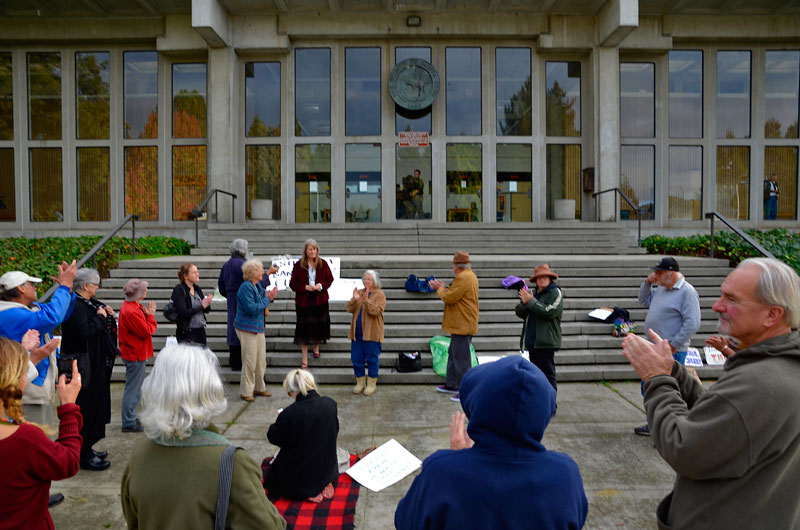
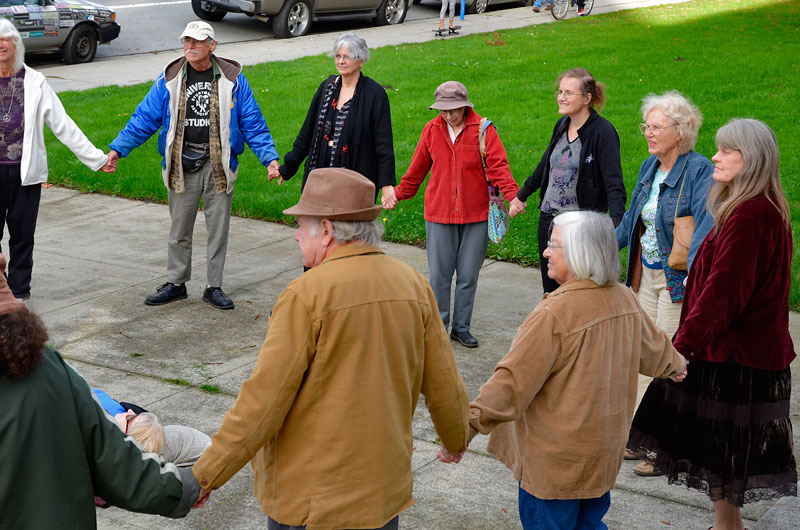
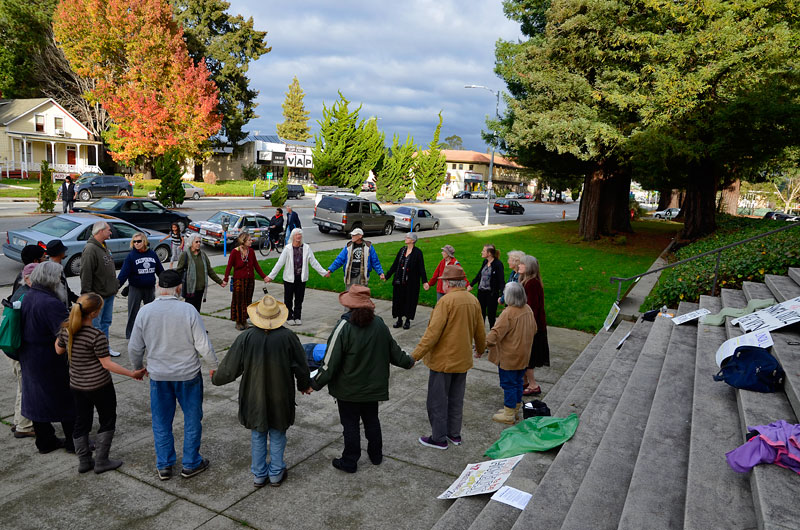
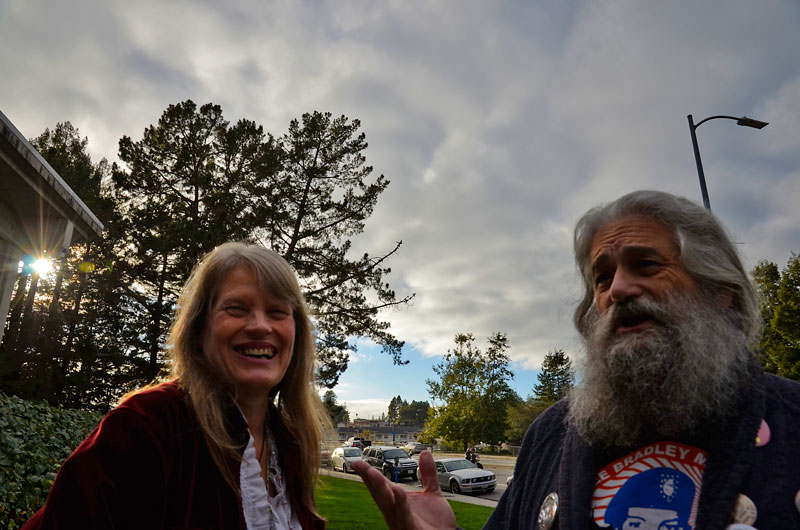
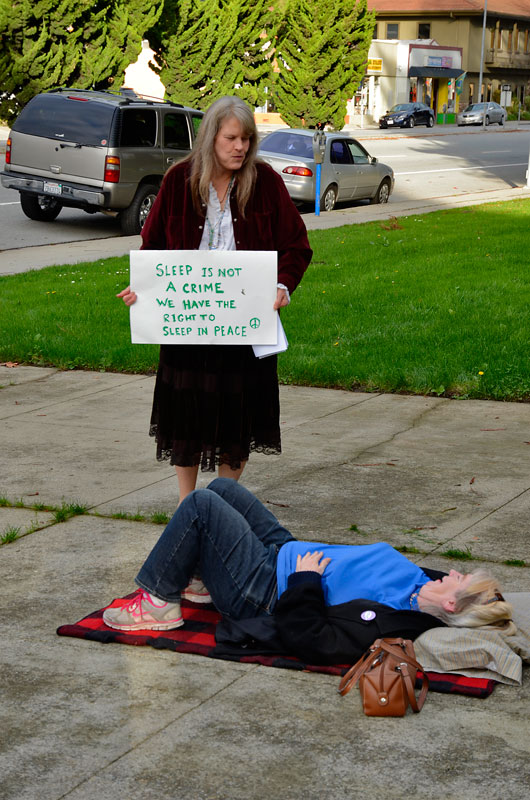
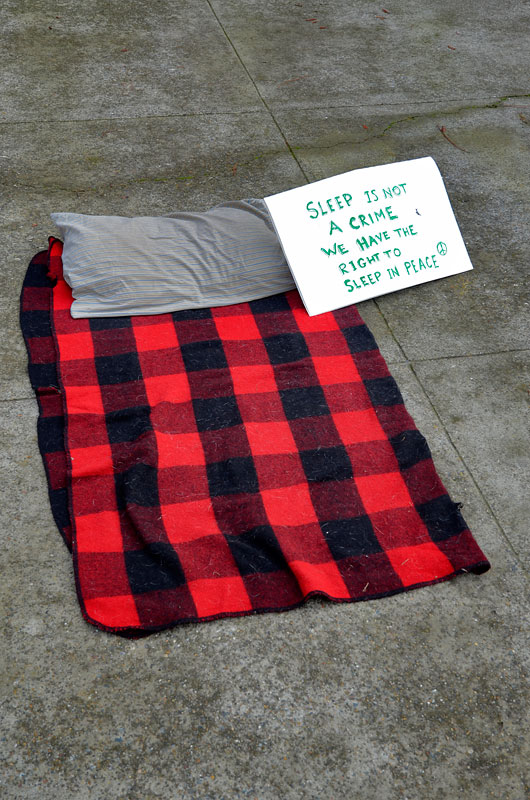
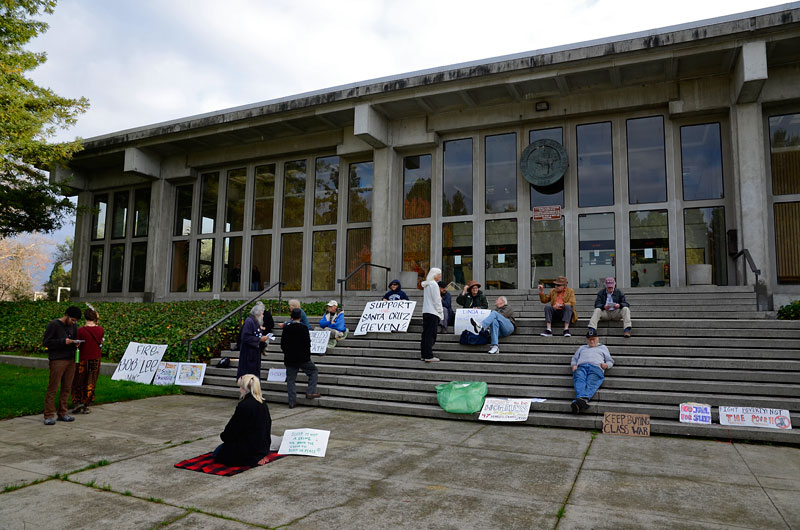
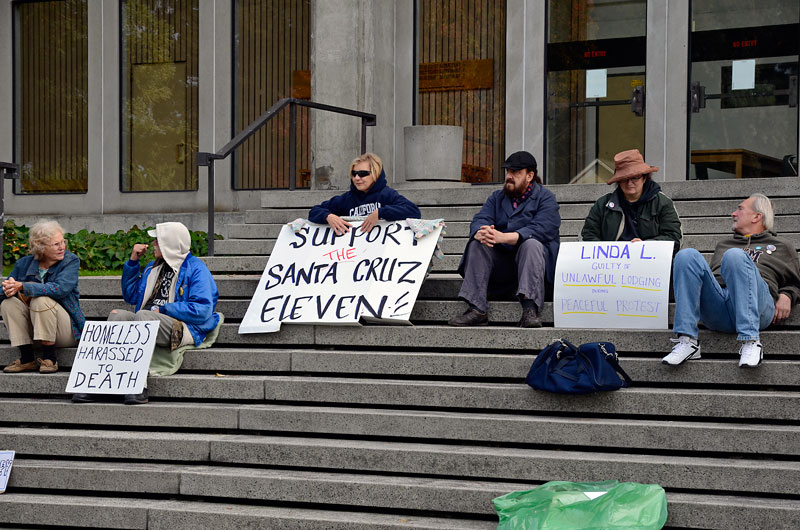
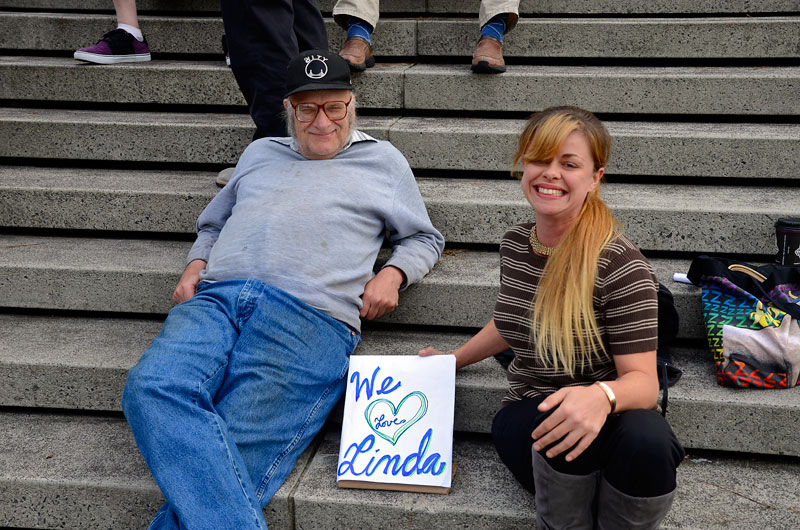
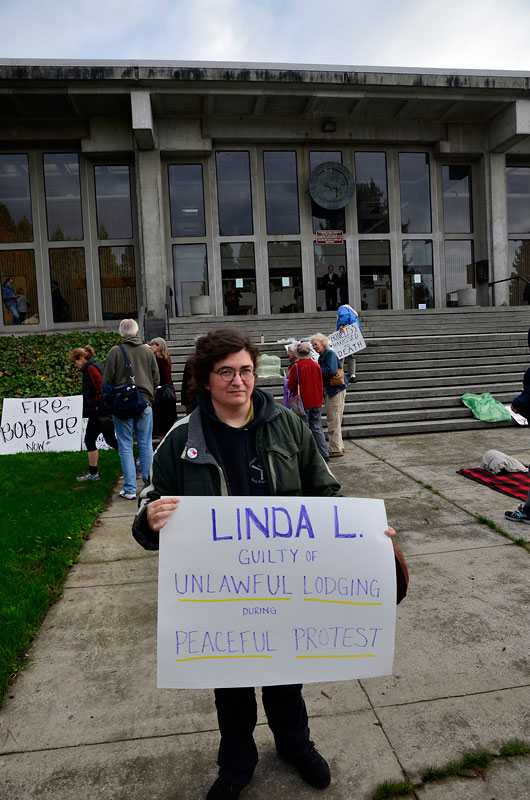
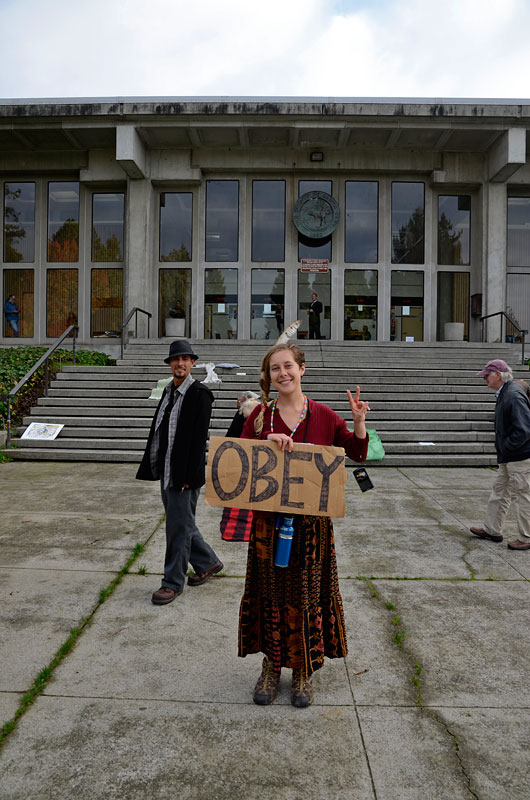
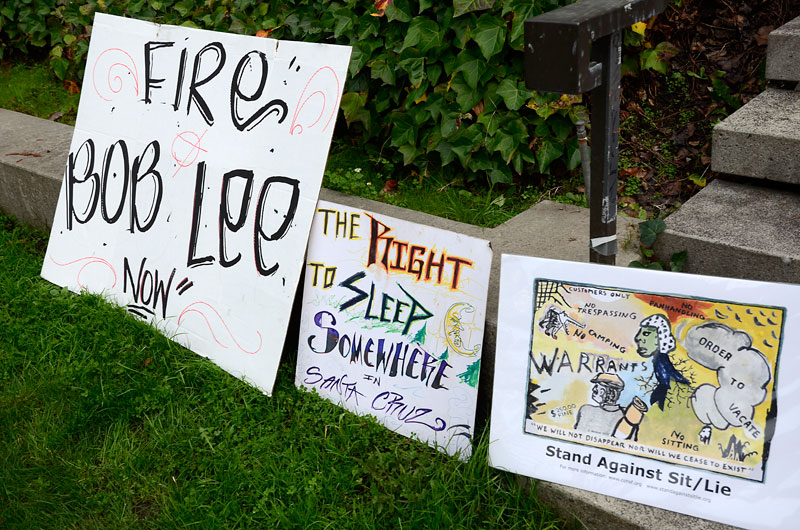
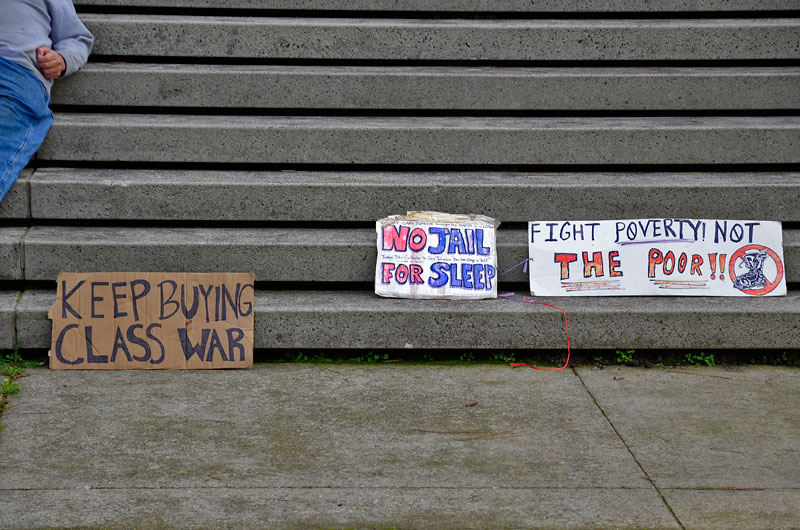
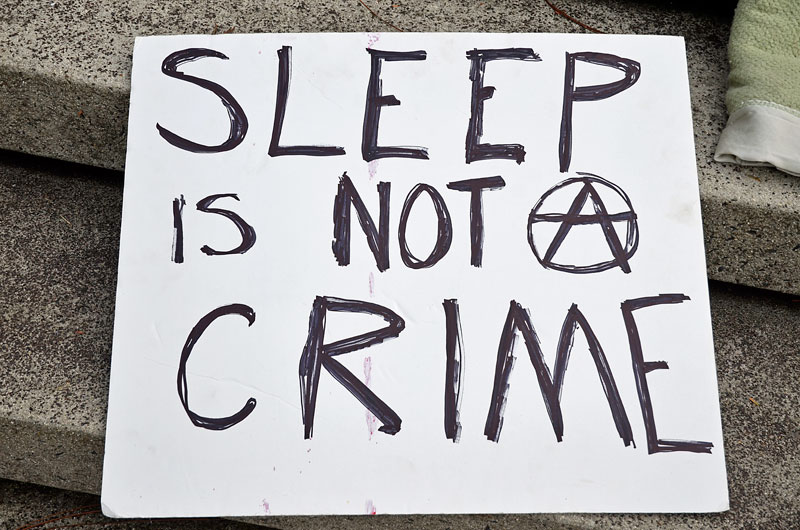


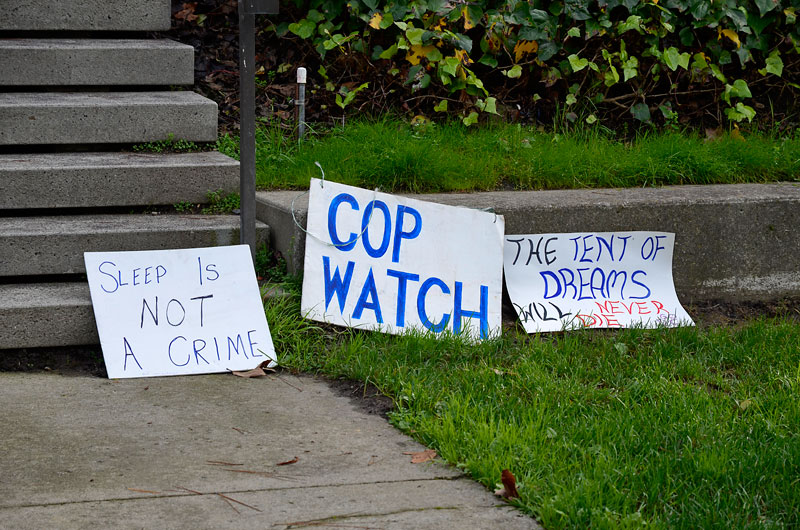

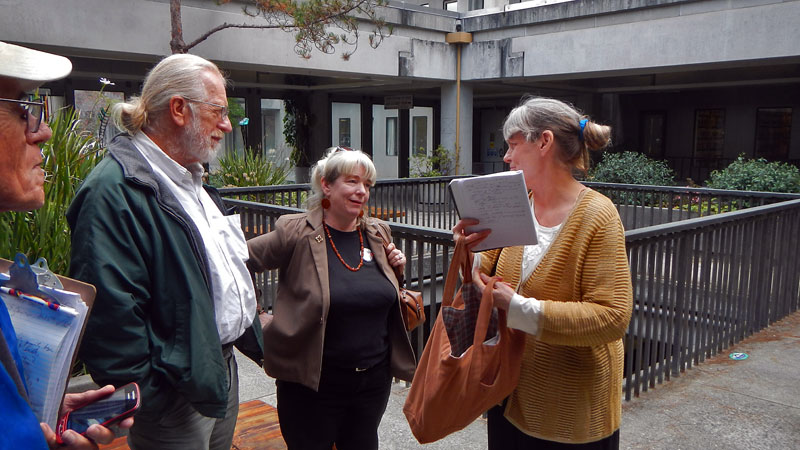
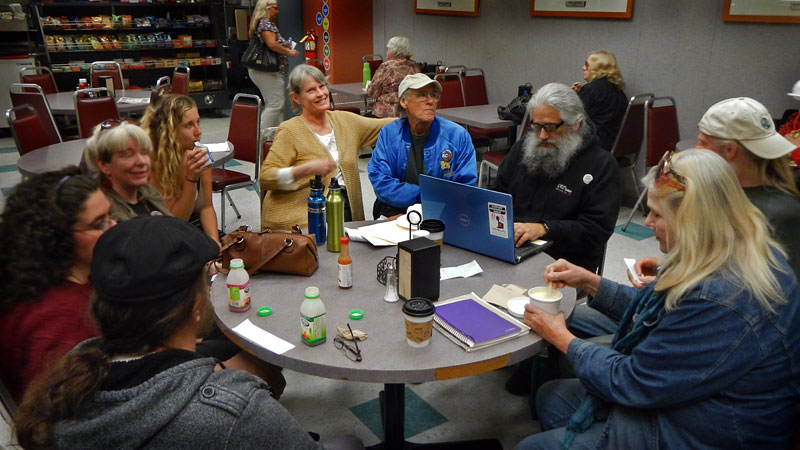


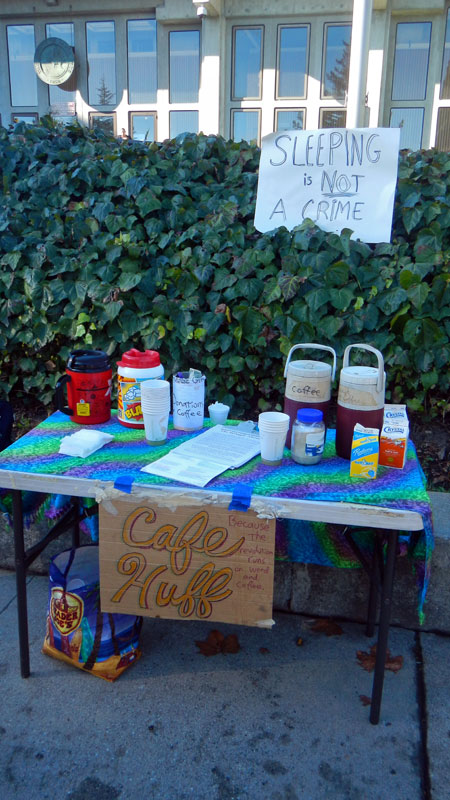


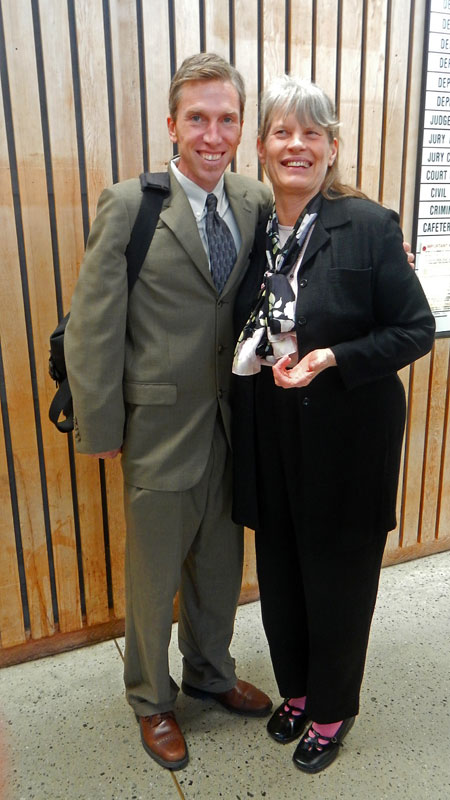
Add Your Comments
Latest Comments
Listed below are the latest comments about this post.
These comments are submitted anonymously by website visitors.
TITLE
AUTHOR
DATE
Not Gonna Make It To Politicians Tea Party 1 - 24
Thu, Jan 24, 2013 3:52AM
Linda is excellent spokesperson for social justice
Fri, Jan 18, 2013 8:18PM
January 24: Bringing Concerns To Legislators And Politicians
Fri, Jan 18, 2013 7:37AM
Linda Inspires Me
Thu, Jan 17, 2013 5:41AM
Lacking a written opinion...
Tue, Jan 15, 2013 10:24AM
We are 100% volunteer and depend on your participation to sustain our efforts!
Get Involved
If you'd like to help with maintaining or developing the website, contact us.
Publish
Publish your stories and upcoming events on Indybay.
Topics
More
Search Indybay's Archives
Advanced Search
►
▼
IMC Network


